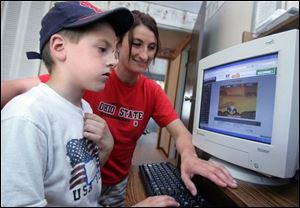
St. Vincent 's expands its services for autistic children
7/1/2008
Leslie Boyle watches her son Joey, 6, play games in their Swanton home. She said the therapist broke 'into Joey's shell.'
Leslie Boyle can still remember the day several years ago when her child-care provider said she suspected Ms. Boyle's young son, Joey, had autism.
"I'm seeing things," she said. "He has obsessions with spinning things. He always has to have something in his hands," the provider told Ms. Boyle.
Ms. Boyle was shocked.
Autism is a developmental disability impacting 1 in every 150 American children and almost 1 in 94 boys. It usually appears during the first three years of life, according to the Autism Society of America.
The disorder impairs a person's ability to communicate and interact with other people.
According to the Centers for Disease Control, children with autism have trouble interacting with others in a variety of ways. They might not speak at all, or if they do speak, they use language in unusual ways, are not able to combine words into meaningful sentences, or repeat the same phrases over and over. They can also have a hard time using and understanding gestures, body language, or tone of voice. It can also be difficult for people with autism to pick up on social cues, according to the center.
Autism is a spectrum of disorders, meaning children who have the condition can be very high-functioning or be very low-functioning, with a host of skill and behavioral problems, and needing constant support throughout the day.
After his diagnosis, Joey began a program with Patty Cunningham, an occupational therapist at St. Vincent Mercy Children's Hospital.
Ms. Cunningham was able to "break into Joey's shell," Ms. Boyle explained. "We saw him start to open up," she said.
Joey began to explore more, speak better, and was more expressive. Ms. Cunningham educated Ms. Boyle and Joey's father on what they could do to help their son.
"She woke me up to my [own] kid," Ms. Boyle said.
Joey, who is 6, still faces the challenges of picking up on social cues, his mother said. Things like how to make friends, reading people's reactions, and modifying his behavior the way most people can, don't come naturally to him.
However, he attends a public school and is considered to be high-functioning.
Ms. Cunningham is the co-leader of the Clinic Home Intensive Program, 1049 South McCord Rd., Holland, which is offered through St. Vincent Mercy Children's Hospital.
The program's first yearlong session began yesterday. The sessions expand the autism services to a four-hour-per- day, four-day-a-week program offering occupational therapy, speech therapy, and applied behavioral analysis, which teaches beginning social skills.
Joey participated in a four-week-long version of the program, which recently expanded to the 12-month offering.
"This was something the community was asking for," Ms. Cunningham said. "Parents said, 'We want more, We want more.'•"
Children must be between the ages of 2 1/2 and 5 years to participate in the program.
The cost is $30,000, but parents are usually eligible for a $20,000 grant from the state to help cover costs, according to the hospital.
Sarah Bednarski, a spokesman for Mercy Health Partners, said the hospital can work with parents on ways to cover the remaining $10,000.
In many ways, the program's location on South McCord Road looks like a typical preschool, with classrooms, tiny, brightly colored, plastic chairs and tables, and a large jungle gym. But everything is fine-tuned to help the children.
The jungle gym is specially designed to help develop gross motor skills.
The color-coordinated classrooms help children transition from one activity to the next, a task that can be difficult for autistic children, said Julie Majo, coordinator of child advocacy for St. Vincent Mercy Children's Hospital.
"Everything needs to be a certain way to fit their comfort zone," Ms. Boyle explained. "[Autistic children] are dependent on schedules. They aren't good with transitions."
Shane and Elaine Dyer, of Gibsonburg, have enrolled their son, A.J., who is almost 5, in the program.
"It's more than what we can provide as a parent," said Mr. Dyer. "To be able to send him to a school that specializes in autism, that is just priceless at this age."
Mr. Dyer added that A.J. will be learning letters and matching words with pictures, as would a child in any preschool, but A.J. will also be learning socialization skills that must be taught to children with autism.
"We are really excited about this program," Mrs. Dyer added. "It is not offered anywhere else. It is an opportunity to maximize the golden window from age 3 to 6 where the brain is quickly developing. If you can 'rewire' their brain [through therapy] at this age, they have a better chance of functioning at a higher level in life."
Mrs. Dyer said she is hoping her son will be able to start first grade without any assistance.
Working with Ms. Cunningham "was a wonderful start for us," Ms. Boyle said.
Though Joey is now too old to participate in the program, he has made progress, his mother said, adding that he has more good days than bad ones.
"It doesn't make him an impossible child," she said. "It doesn't make him a bad kid. It doesn't make him unlovable. He's just my Joey."
She added, "He's going to need help. But he is bright enough and smart enough that [when he grows up] he will live on his own. He will function in society."
Contact Kate Giammarise at:
kgiammarise@theblade.com
or 419-724-6133.